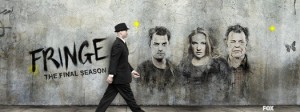 Increasing our intelligence level is a positive goal for improving ourselves and our culture. And wouldn’t we all be better off as people if we could eliminate emotions like anger and greed? Theoretically, yes. But as the latest episode of the TV series “Fringe” explored, the answer isn’t that simple.
Increasing our intelligence level is a positive goal for improving ourselves and our culture. And wouldn’t we all be better off as people if we could eliminate emotions like anger and greed? Theoretically, yes. But as the latest episode of the TV series “Fringe” explored, the answer isn’t that simple.
First, I have to admit to a mistake in my previous “Fringe” post about the child Observer, Michael, who was supposed to be killed for being a genetic anomaly that experienced emotions. I referred to the world-dominating, Gestapo-like, heartless, humorless Observers as a “race of aliens.”
As a couple of commenters on that post informed me, the Observers aren’t aliens at all; they’re human beings from the 27th century. That means we somehow managed to evolve into virtual Nazis in the not-too-distant future. How could that happen? Like a lot of roads to hell, it started with good intentions.
(Spoilers Ahead) In Episode 11, entitled “The Boy Must Live,” that history is explained by a former Observer named September, who has been a recurring character since Season One. As part of an expedition of Observers from the future tasked with studying historic humanity, September always felt inexplicably drawn to the bonds of love he saw between fathers and sons – especially Walter and Peter Bishop, two of the show’s three central characters. Because of September’s weakness for emotion, his superiors punished him by subjecting him to “biological reversion.” But reversion from what exactly?
Relating both the history of what happened and Michael’s significance, September explains:
“Like all of our kind, [the boy] was created in a lab using the genetic material from a designated donor. It was a process that began generations earlier with a discovery on February 20, 2167 by a scientist in Oslo, Norway,who was trying to find ways to increase human intelligence. He realized that if he could rewire the portion of the human brain that induces jealousy, he could increase cognitive function, sacrificing emotion for intelligence. This discovery was the catalyst for the creation of the beings you called Observers. As his work carried on, more and more emotions were seen as roadblocks to higher intelligence, things like anger, greed, aggression – they were abandoned in the pursuit of intellect. Eventually humanity became so intelligent and efficient, they lost perspective of the value of these emotions – not only the negative ones, but the positive as well. Soon empathy, compassion and love became messy distractions. They too were machined out. Without romantic love, they developed new reproductive technologies. Early in the boys maturation, the scientist in charge of reproduction realized that his brain had developed differently from the other offspring. To them, he was an anomaly, a defect. I observed in your time how fathers care for their sons and protected them. It stirred something in me that I could not ignore.”
In other words, scientists and political leaders thought they could create a better, more perfect human being by mechanically altering our brains. In doing so, they unintentionally eradicated the best parts of ourselves that make life worth living. Even worse, they didn’t seem to realize what they were losing by proceeding down their chosen path. Progress, intellect and mechanical efficiency superseded hope and joy and courage. Then the unintentional losses became fully part of the plan.
With our culture’s incessant emphasis on sex, you’d think the Observers would at least keep that practice intact. But divorced from both procreation and pleasure, even sex became just another unnecessary bodily function in the Observers’ coldly clinical world. In their ideal form, love and sex are a mutual self-giving for the good of the other person. Of course, self-giving has no place in a world where you consider yourself the highest good.
That idea of a higher good comes into play when the Observers search September’s now-abandoned apartment. They find a “Holy Bible” laying on his desk and look at it as an oddity. The suggestion is that worship of any kind of higher being is completely antithetical to their self-absorbed worldview. September, on the other hand, has been biologically reverted to a normal person just like us, so he sees faith and humility as one of humanity’s strengths. His lack of self-importance gives him a freedom and insight the Observers don’t have.
When the Observers find a record player in the apartment and turn it on, it starts playing jazz. Again, they listen to it as some kind of strange curiosity because music and beauty have no functional purpose in their view. But then something interesting happens. They discover that they have unconsciously started tapping their feet to the music. Could it be that the spiritual part of their nature still exists despite the extensive bioengineering? The Observers have no concept of spirituality, but not acknowledging something doesn’t mean it’s not real.
Looked at through a Christian lens, it’s easy to agree that the scientists’ original goal of overcoming anger and greed is a good thing. The problem is their solution. They sought the answer in biology; we seek it through religion and spirituality.
Jesus acknowledges that human weakness exists, but calls us to choose a better, more godly way of living. He asks us to follow Him. His way leads to the cross, the ultimate act of self-denying love. But it also leads to the ultimate victory.
“Fringe’s” story makes clear that its heroes are motivated by love, a love that has led several characters to sacrifice their own lives for the sake of others, a love that will likely lead to more sacrifice as the series ends this Friday, Jan. 18 at 8pm Eastern.
In other words, it celebrates life and relationships – and all the beauty, messiness, joy, pain, success and failure that come with them.
Previous Posts About “Fringe:”
– “Fringe” Explores Love, Humanity, & Destroying Children Who Are “Chromosomal Mistakes”
– Tyranny, Hope, and Family in the Fifth Season Premiere of “Fringe”












